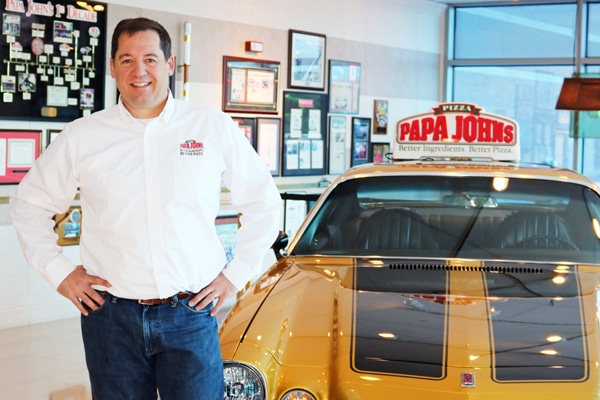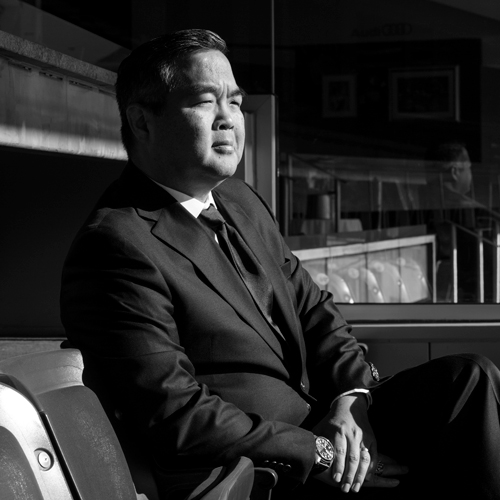
While most of his classmates and friends were off moving to exciting business careers after college, John Matter returned home to Arizona to take care of his ailing mother and began waiting tables at a local upscale restaurant. When Matter decided to return to school for the JD/MBA program at the University of Arizona, the lessons he’d learned in the service industry proved essential. “I learned a lot about customer service from working in a restaurant,” Matter says. “The customer service side of the restaurant industry applies to a key element of being a good lawyer: taking care of your clients. That job really helped me become a better lawyer in the long run.” Now, as vice president and senior counsel for Papa John’s International, Inc, Matter has returned to the restaurant industry, and he is utilizing those lessons to address a vast scope of challenging legal topics.
After completing law school, Matter spent ten years in private practice focusing on litigation and general corporate law. However, working at a law firm didn’t fulfill the interest in the collaborative aspects of business he’d developed in his joint JD/MBA program. After earning a master’s degree with distinction in global management and international business at Thunderbird School of Global Management while concurrently practicing law, Matter knew he’d eventually move in-house.
His first in-house posting came as director of legal affairs at PharMerica, a publicly-traded long-term care pharmacy company that indulged his passion for a collaborative, complex business, as well as his desire to make a difference in the world.
“Being a lawyer is one of the professions where you really get to help people. You are a trusted adviser and help people through difficult issues or complex problems,” he says.
When a position opened at Papa John’s, Matter jumped at the chance to work for the rapidly growing international restaurant company. Matter joined Papa John’s in 2013, rising to become vice president and senior counsel in the legal department. As one of the largest pizza companies in the world, Papa John’s many departments and offices naturally face a wide array of opportunities and challenges. Because of that, Matter could, on any given day, be working closely on a project with HR, technology, outside counsel, or any specialty in between. “It’s a great mix,” he says. “I spend half my time supporting business units, helping the company operations, and getting involved in more complex legal issues. The other half of my time is geared more toward managing our litigation and mitigating risk.”
One important project that should go a long way in mitigating risk has brought Matter into close collaboration with technology and operations in particular. Matter helped develop a partnership with Drivosity, through which Papa John’s is putting GPS-enabled devices into delivery vehicles. The devices help monitor the company’s drivers’ delivery routes, speed, braking, cornering, and more. From his time managing litigation, he knows that these devices will protect Papa John’s from personal injury claims, but more importantly, it will help ensure the safety of the company’s drivers and others on the road.
“We have around seven hundred corporate stores, which makes the rollout a large undertaking in terms of logistics and technology, not to mention operations and HR,” Matter explains. “As the legal partner, we’ve made sure to explain to people what the benefit is to the driver, the manager, and the company in general. We care about our people, and we want them to be safe.”
A frontrunner in technological advancements such as online ordering and mobile apps, Papa John’s is excited about the Drivosity partnership and what it can mean to customers, but it has also been sure to keep an eye on potential risks and challenges. While other restaurants might work in traditional brick-and-mortar ideologies, Papa John’s also has to operate similar to an e-commerce company. As such, Matter has to deal with the intellectual property (IP) concerns that come along with that model. “Any time you have customer-facing technology, you’re exposed to patent trolls and lawsuits,” Matter says.
Papa John’s has also moved agilely to address the influx of restaurant aggregators and delivery services such as GrubHub, Postmates, and UberEATS over the past few years. “That’s a relatively significant phenomenon in the delivery space, and I have spent a lot of time not only analyzing the legal aspects of potential partnerships with those companies but also the developing area of the law in terms of how they operate,” Matter says. “My job as a lawyer is to figure out what’s the best way we can partner with these companies in a way that protects our brand and doesn’t expose us to unnecessary risk and ensures that we are doing things the right way for our team members, franchisees, and customers.”
While the proper contract will cover several of those concerns, Matter is quick to note that many of these companies work with individuals as independent contractors rather than employees. It’s important to note, as well, that Papa John’s restaurants are a blend of corporate and franchised. With all of these different, complex models at play, Matter and his team have had to work incredibly collaboratively, both internally and externally. Rather than micromanage, Matter hopes to give his direct team the opportunities they need to grow and thrive—a belief in line with the company’s “Go Left” leadership program, which emphasizes coaching up skills and strengthening culture.
The thirteen-person legal department is lean, he says, but the general counsel, Caroline Oyler, has done a great job supporting the unique expertise of each contributor. That way, they can make their own contribution, whether in governance, food supply, franchising, or more.
The restaurant and delivery industry has changed significantly over the course of Matter’s tenure at Papa John’s, and the speed of that change shows no signs of slowing. “It’s a different environment, and we’re dedicated to figuring out the best way to move forward in that complexity,” Matter says. “But owning your career, taking on responsibility, and learning new areas of the law are the keys to becoming a successful corporate attorney.”
Photo: Kevin Matthews, Lyndsay Railey

